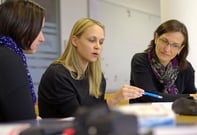Published on
Graduate Certificates Are The New Normal

Young professional engineers are a special breed. They typically have a strong work ethic that helped them complete a difficult degree. They are dedicated to their profession and its standards of performance, most of them completing a rigorous path to earn the Professional Engineer (PE) designation as soon as they are eligible. They are not strangers to continuous professional development, since they must earn continuing education credits every year to keep the PE designation and remain licensed by their state. However, their demanding work schedules often make pursuing an advanced degree difficult.
Industry leaders asked for a way for their best professional employees to acquire graduate-level knowledge in a condensed form. The answer: the Graduate Certificate Program offered at Auburn University’s Samuel Ginn College of Engineering (ranked #12 by U.S. News and World Report). This program makes relevant and focused subject matter available to engineers already working in industry. The curriculum is carefully selected to meet specific industry needs. Our online certificate program allows a student to take courses at their convenience and from any location in the world. Course quality, content and material is identical for on-campus and online students, allowing online students as close to an on-campus experience as possible.
For example, a student in the Cybersecurity Engineering Graduate Certificate program would complete three courses (9 credit hours) in computer science and software engineering graduate-level (6000/7000) course work, including:
- COMP 6350/6 Digital Forensics 3 hours
- COMP 6370/6 Computer and Network Security 3 hours
- COMP 7370/6 Advanced Computer and Network Security 3 hours
Online students have access to the same resources and materials as the on-campus students. The Learning Management System used on campus (Canvas) interfaces with the online delivery system (Panopto), thereby allowing on- and off-campus students the same access to course content and relevant materials posted by the instructor.
Using lecture capture, all on-campus courses designated as online courses are made available to online students via live-streaming. Students can also download lectures and view them later. Detailed instructions are provided as online students begin the curriculum and technical assistance is available for students who encounter problems with the learning management system or the delivery system. Any timed assignments, such as quizzes or exams, are administered by a pre-approved proctor who coordinates with the instructor to submit documents for grading.
Online students have the ability to interact with both their instructors and their fellow classmates (on and off campus) using any communication method they choose. While campus email is the most common form used, both Canvas (the learning management system) and Panopto (the lecture capture delivery system) have functionality which allows students to engage in real time. Courses which include a group or team project may require or encourage each team to include an appropriate blend of on-campus and online students, which provides an enhanced experience for both groups.
The best news is that all academic work in the certificate programs is credit bearing and therefore the hours earned in a certificate program may be applied to a Master’s degree. Graduate Certificates are also less expensive and can be earned in less time because the certificate programs vary in length from 9 credit hours to 15 credit hours, depending on which academic discipline is selected.
Auburn offers the following online Graduate Certificate programs:
- Automotive Manufacturing Systems
- Cybersecurity Engineering
- Modeling and Data Analytics
- Occupational Safety and Ergonomics
- Power Engineering
- Pulp and Paper Engineering
- Tribology
Additional certificates are under development and will be announced as they are available.
By building a robust online education platform that allows students to go beyond purely credit-bearing offerings—creating access to professional development certificates and more—universities can create an environment designed around the needs of the modern working professional. After all, the modern employee has to be a lifelong learner, and programming like this is becoming our new normal.
Author Perspective: Administrator



